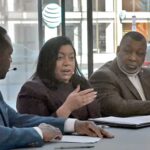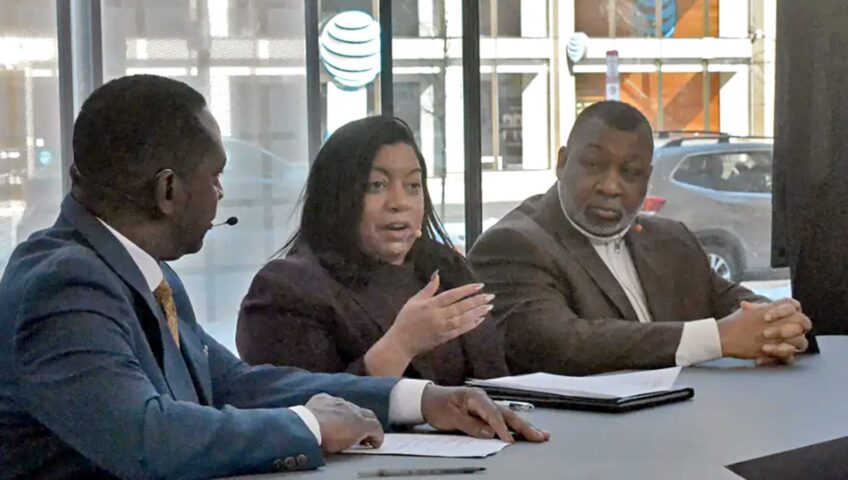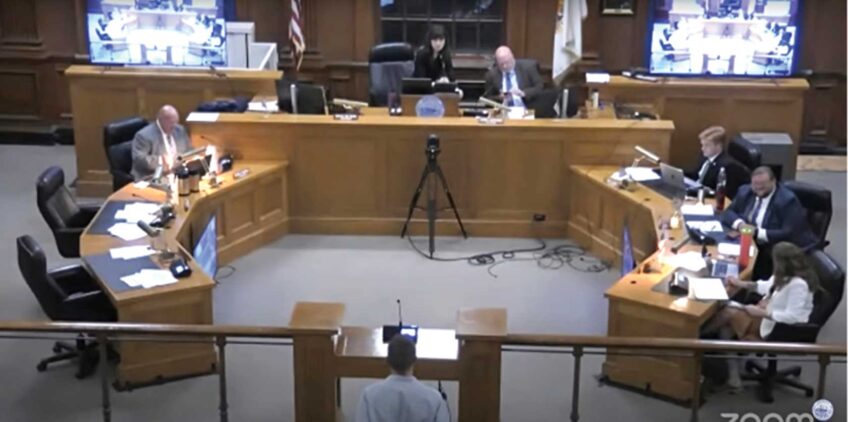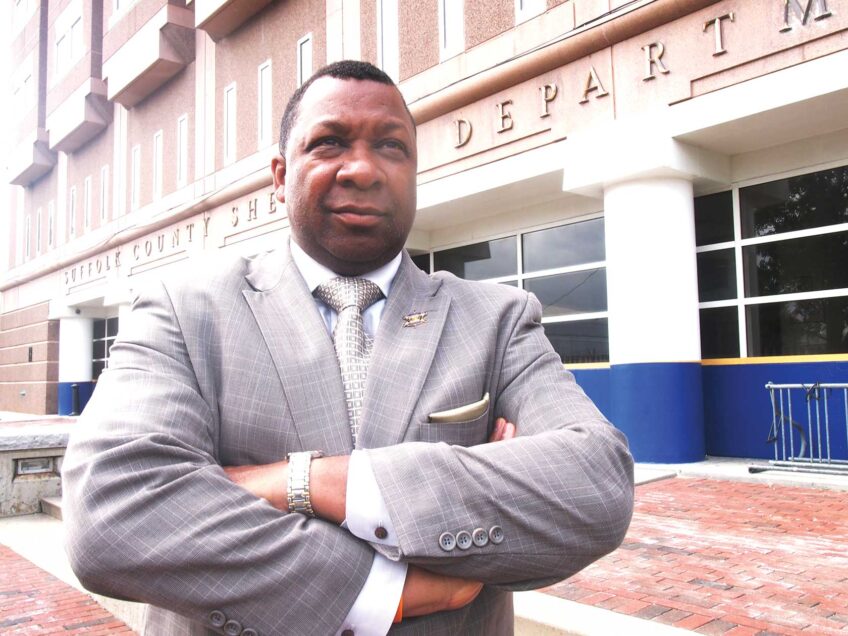Program aims to bring health benefits, longer life to Black elders through social connection
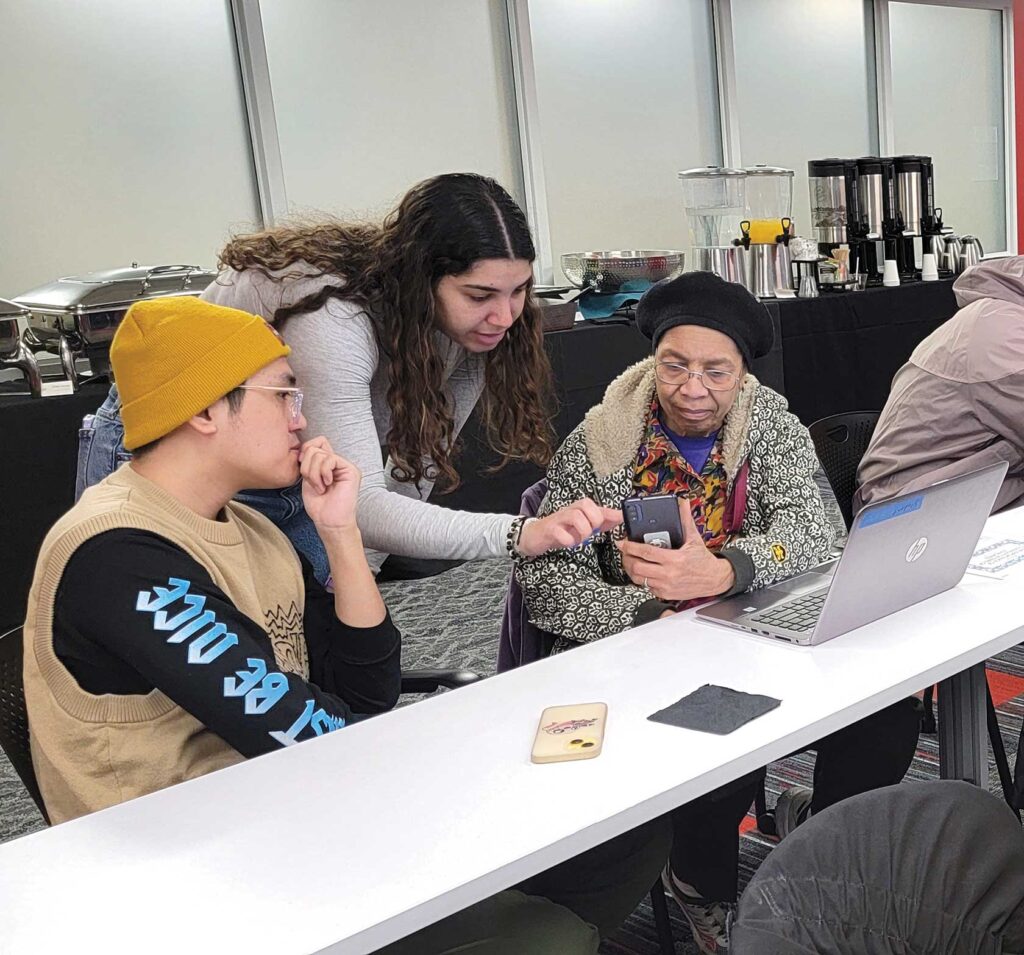
A partnership between public health experts and local groups is looking to bring the health benefits of community connection to elders in Boston’s Black community.
Through a months-long pilot program, called Operation Elder Connect, run earlier this year, researchers at the Massachusetts College of Pharmacy and Health Studies alongside the Elder Health Care Disparities Coalition connected community elders with students to prevent the health impacts that can come from extended loneliness and social isolation.
The groups are, together, planning on launching a new cohort in 2025.
During the pilot, 10 Black community elders were brought together with students at the Massachusetts College of Pharmacy and Health Sciences for what was initially planned to be an 11-week program focused on connection and education.
The program was developed following a 2023 report from the United States Surgeon General that identified loneliness and isolation as epidemics facing the country.
That report identified a host of issues that can arise from a lack of connection, but Keri Griffin, dean of the MCPHS Center for Research and Discovery, said that the point that really drove home the information for her was one statistic comparing the issue to the longer-fought, and better-known, public health battle against tobacco and smoking.
According to the surgeon general’s report, loneliness and isolation can increase the risk for premature death by an amount comparable to smoking 15 cigarettes per day.
“For me, that’s the big takeaway,” Griffin said. “It helps people understand and put in perspective how dangerous this loneliness and lack of social connection actually is.”
The 2023 report outlined the potential health impacts of loneliness and isolation: increased risk of heart disease and stroke, dementia, depression and anxiety.
Conversely, greater connection can have benefits like improved disease management for people with diabetes, as well as motivation to get and stay healthy.
In that report, adults over 65 years of age were identified as experiencing the highest rates of social isolation, but young adults were almost twice as likely to report feeling lonely.
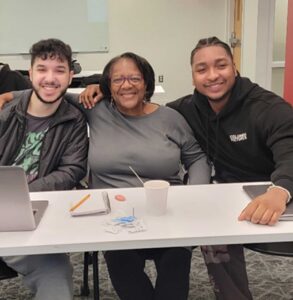
Massachusetts College of Pharmacy and Health Sciences students pose with community elder Earline Salley (center) during a meeting of Operation Elder Connect, a program aimed at addressing elder and young adult loneliness and isolation. The original pilot, which ran in spring of 2024, brought the students together with Black community elders to increase connection and teach things like technology skills. PHOTO: KERI GRIFFIN
The landscape of loneliness and isolation was exacerbated during the COVID-19 pandemic, with orders to stay at home and keep distance from others.
Griffin said many were able to use technology and social media as key tools for increasing and maintaining connection during the pandemic, but those supports weren’t universally accessible.
“They were able to create networks and create community that stood in the way of this loneliness that we know was so dangerous,” she said. “For a lot of elders, they just lacked the access to the technology or the ability to utilize the technology.”
The pilot program aimed to address both those gaps by connecting older Black Boston community members with the students to not only aim to reduce loneliness, but also provide technology education and work to close digital literacy gaps.
In that work, it was important to the team to make sure that efforts to educate community elders were done so with cultural competency, said Ronald Lammy, president and CEO of the Elder Health Care Disparities Coalition.
Throughout the program, experts on a variety of subject matter, from how to use technological resources to nutrition to banking and financial tools, were brought in to teach participants. All of them were of the African diaspora.
“When we looked at who were the presenters, [it was important that there was] cultural humility, nobody talking down to [the participants], listening and in some respects, learning as well,” Lammy said. “It was two sided, and that’s the impact in the community that we want to expand.”
The scope of the pilot was relatively small, with 10 participants, so Griffin said it can be challenging to draw conclusive findings, but the work did suggest some associations and pointed to risks of loneliness and potential solutions.
“I think it’s important to recognize that when there are risks that we can evaluate and assess, and when there are opportunities to intervene, that we respond to those calls to action … and we combine our strengths,” Griffin said.
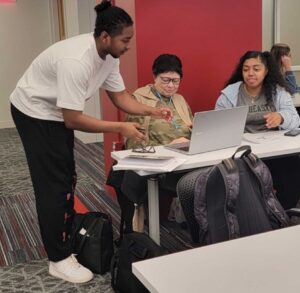
Massachusetts College of Pharmacy and Health Sciences students show community elder Lillie Bryan (center) technology skills as part of Operation Elder Connect. PHOTO: KERI GRIFFIN
But even with the small sample size, she said some of the results were statistically significant. She pointed to changes in participant responses to questions about how often they could find companionship when they wanted it, how often they felt they had people they could talk to and how often they felt there were people they could turn to — all questions from the UCLA Loneliness Scale, a tool developed by psychologists to assess how often a person feels disconnected from others — which saw significant shifts before and after the pilot program.
For all three of those questions, participants who initially said they never or rarely had those connections dropped or disappeared entirely when asked again following the program.
For some, it offered much-needed support. Griffin said one participant was recently widowed and said that the program and the connections she made with the other participants gave her something to get out of bed for.
For her students, Griffin said the program made the younger participants reassess their interactions with the elders in their life. Some would come to her and say that taking part in the program made them call their grandparents more. Another said she now wants to commit to studying aging processes.
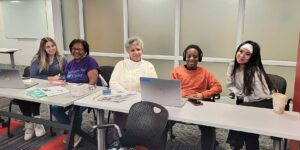
Massachusetts College of Pharmacy and Health Sciences students pose with community elders Earline Salley (center left) and Brenda Howard (center) during a meeting of Operation Elder Connect, a program aimed at addressing elder and young adult loneliness and isolation. PHOTO: KERI GRIFFIN
Griffin said that there was a noticeable investment and engagement in the program from both the older and younger participants.
“I think the joy from both groups was palpable, and it was genuine, and it really felt like there were true connections that had been made,” she said.
Some of the elder participants had taken part in similar programs connecting older community members with younger ones, but Griffin said they felt a stronger, more genuine connection in this pilot.
And that engagement showed, Lammy said. The pilot was initially slated to end in April, but participants asked for more, a request that led to meetings through December.
“We could never have imagined that, but it spoke to their reaction and responsiveness to, or description of what were their interests, and what they were experiencing,” he said.
Lammy said he sees it as a representation of the importance of engaging individuals in the efforts that are aimed to support them.
“This was the voice of the community playing a part in the design of what was in their best interest,” he said.
Those same participants felt so connected that as the new cohort begins in the new year, the first group will continue to be involved as peer mentors in the next round.
The project was developed in partnership with both academic institutions and local groups and nonprofits, a team-up that was important to tempering community mistrust in academic institutions.
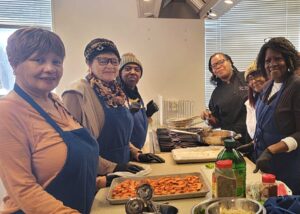
(Left to right) community residents Margo Blackwell-Moquin, Lillie Bryan, Laureatha Duncan, Catherine Brown and Mattie Deed take part in a session as part of Operation Elder Connect, a program aimed at addressing elder and young adult loneliness and isolation. PHOTO: KERI GRIFFIN
Lammy said that when they started putting together the cohort for the pilot, the team had to contend with skepticism and a lack of trust with the academic connection. Within weeks of starting the program, however, as news about it spread through communities by word-of-mouth, perspectives were quick to shift.
“Within a week or two, we had a number of requests to join at that time from people who had heard about it,” Lammy said. “When they got feedback or comments from those who were participating, and they went into their own group meetings and talked about it, we had about seven or eight requests, ‘Could we join?’”
As the team looks toward launching a new cohort in 2025 — one that Lammy said he hopes will be larger, anywhere from double the size of the original pilot to as many as 60 participants — they’re seeking new funding as well as recruiting new community residents to be involved.
That partnership between the academic world and community groups is also important as the team looks to make sure it includes community members who are harder to reach, with those groups serving as an important link to individuals who have less access to technology.
“It’s easy to send out an email and say, ‘Oh, there’s this program,’ but we’re limiting, then, the information to people who have access to those types of resources, the ability to check email, a device on which to check email,” Griffin said. “We want to make sure that we are reaching populations in our community that are not connected, who have been left behind in terms of access and opportunity.”

